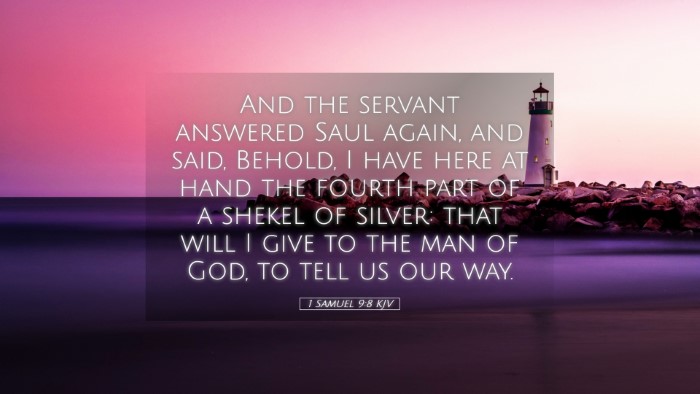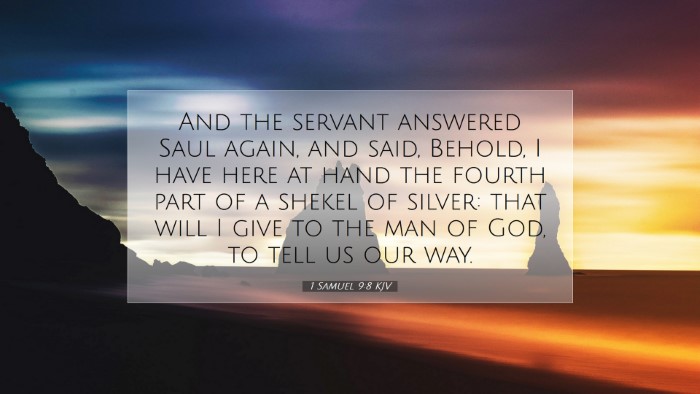Commentary on 1 Samuel 9:8
1 Samuel 9:8 states: “And the servant answered Saul again, and said, Behold, I have here at hand the fourth part of a shekel of silver: that will I give to the man of God, to tell us our way.” This passage serves as a pivotal moment in the narrative, revealing the dynamics of God's providence and the unfolding plan for Israel through Saul's anointing as king.
Contextual Overview
This verse is situated in a transformative time in Israel's history. The people are in search of a leader, and God is guiding Saul to the prophet Samuel. The mention of the servant providing a monetary gift to the man of God reflects the customs surrounding prophets and their remuneration, which were grounded in respect and acknowledgment of their divine role.
Insights from Public Domain Commentaries
Matthew Henry’s Commentary
Matthew Henry emphasizes the profound theme of providence in this chapter. He points out that God orchestrates events in ways that may appear incidental but are, in fact, part of His divine plan. Saul, who was initially searching for his father's lost donkeys, is led to Samuel not only to receive guidance but to encounter his divine destiny:
- Divine Providence: This event highlights how God uses ordinary circumstances to lead individuals to significant spiritual encounters.
- Submission to God’s Order: Saul's servant demonstrates attentiveness and readiness in providing a gift to the prophet, illustrating a proper approach to seeking divine counsel.
Albert Barnes’ Notes on the Bible
Barnes discusses the cultural implications of the monetary offering in this verse. He notes:
- Monetary Gift: The "fourth part of a shekel" indicates a customary practice where individuals provided offerings for prophetic services, emphasizing the need to honor the prophetic ministry.
- Act of Faith: The offering signifies Saul's and his servant’s faith and recognition of the legitimacy of Samuel's prophetic role.
Adam Clarke’s Commentary
Adam Clarke delves into the practicalities surrounding the journey of Saul and his servant, connecting this moment of seeking guidance with broader themes of leadership. Clarke points out:
- Leadership Qualities: Saul's willingness to seek guidance shows humility and the necessary qualities of wisdom and discernment needed in a leader.
- God’s Preparation: Clarke highlights that God's methods often involve preparation through humble beginnings, which is evident in Saul's quest for direction.
Theological Implications
This verse holds significant theological meaning, particularly in relation to God’s sovereignty and human agency. The narrative illustrates:
- Sovereignty of God: The unfolding events, including Saul's search and the servant's prompting, reveal God's intricate guidance in human affairs.
- Human Responsibility: Saul's decision to seek out Samuel depicts an important aspect of faith—recognizing when to submit to divine leadership and guidance.
Application for Today’s Believers
1 Samuel 9:8 invites contemporary believers, especially pastors and theologians, to consider how they pursue wisdom and guidance in their ministries. Key reflections include:
- Seeking Guidance: Like Saul, believers are encouraged to approach spiritual leaders and seek divine counsel through prayer, study, and community.
- Faithful Stewardship: Acknowledging the value of spiritual guidance through appropriate offerings and support for those who lead congregations.
- Humility in Leadership: Emulating Saul’s servant, leaders should maintain an attitude of humility and service, recognizing their dependence on God.
Conclusion
In summary, 1 Samuel 9:8 is a rich verse that encapsulates key themes of divine providence, the importance of respecting spiritual authority, and the dynamics of leadership under God's guidance. By reflecting on the insights provided by historical commentaries, believers can draw practical applications for their own lives and ministries, affirming the relevance of Scripture in guiding their spiritual journeys today.


